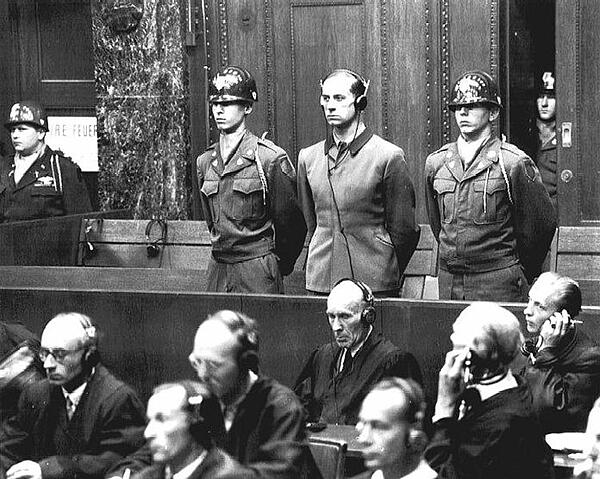The Doctors' Trial 1946
Once World War Two had ended, courts were established across Germany to provide sites for the prosecution of German officials for their roles in war crimes, crimes against humanity and crimes against peace. On 9 December 1946, an American military tribunal opened proceedings against 23 German physicians, nine of whom had previously been SS or Waffen-SS members.
This case became known as Number 1 in the Nuremberg War Crime Trials, with each person facing the following charges:
- Common design or conspiracy
- War crimes
- Crimes against humanity
- Membership of a criminal organisation
The physicians were all accused of having planned and implemented a Euthanasia Program that sought to eradicate those deemed by Adolf Hitler and the Nazis as being "unworthy of life". Additionally, many physicians conducted medical experiments on those held in concentration camps during the war, which resulted in many people being killed or suffering significant damage.

During the trials of those accused of having conducted medival experienced, some of the specifics of their actions were revealed. These actions included placing people at high altitudes to examine the impact of altitude on anatomy, forcing people to drink seawater, infecting people with typhus and jaundice, and even conducting operations as part of Nazi Germany's mass sterilisation programme.
It took almost 140 days for judges to assess the testimonies of 85 witnesses and almost 1,500 documents, with the verdict pronounced on 20 August 1947. In total, 16 of the doctors put on trial were found guilty of their charges, with seven of them sentenced to death. This included Karl Brandt (Hitler's personal physician), Waldemar Hoven (Chief Doctor of Buchenwald concentration camp) and Wolfram Sievers (Director of the Institute for Military Scientific Research).
The remaining defendants were either acquitted or given a jail sentence. Herta Oberheuser, the only woman on trial, was given the latter, receiving a sentence of 20 yers in prison for her crimes at Auschwitz and Ravensbrück concentration camps.
Below are the verdicts of the Doctor’s Trial:
| Becker-Freysing, Hermann; Captain in Medical Corps: | 20 years in prison commuted to 10 years |
|---|---|
| Beigelböck, Wilhelm; Captain in Medical Corps: | 15 years in prison commuted to 10 years |
| Blome, Kurt; Deputy Reich Health Leader: | Acquitted* |
| Brack, Victor; Chief Administrative Officer at Reich Chancellery: | Death |
| Brandt, Karl; Major-General in Waffen-SS: | Death |
| Brandt, Rudolf; Colonel in SS: | Death |
| Fischer, Fritz; Major in Waffen-SS: | Life in prison commuted to 15 years |
| Gebhardt, Karl; Chief Surgeon to the Reich: | Death |
| Genzken, Karl; Chief of Medical Service in Waffen-SS: | Life in prison commuted to 20 years. |
| Handloser, Siegfried; Lieutenant General in Medical Corps: | Life in prison commuted to 20 years |
| Hoven, Waldemar; Camp physician at Buchenwald, Captain in SS: | Death |
| Mrugowsky, Joachim; Colonel in SS: | Death |
| Oberheuser, Herta; Physician at the Auschwitz and Ravensbrück concentration camps: | 20 years in prison commuted to 10 years |
| Pokorny, Adolf; Urologist practicing in Munich: | Acquitted |
| Poppendick, Helmut; Colonel in SS: 10 years in prison | Released in 1951 |
| Romberg, Hans Wolfgang; German Experimental Institute for Aviation: | Acquitted |
| Rose, Gerhart; Brigadier General in Medical Corps: | Life in prison commuted to 20 years |
| Rostock, Paul; Brigadier General in Medical Corps: | Acquitted |
| Ruff, Siegfried; Chief of the Institute of Aviation Medicine in Berlin: | Acquitted |
| Schäfer, Konrad; NCO medical officer: | Acquitted |
| Schröder, Oskar; Lieutenant General in Medical Corps: | Life in prison commuted to 15 years |
| Sievers, Wolfram; Colonel in SS: | Death |
| Welz, Georg; Lieutenant General in Medical Corps: | Acquitted |
*later tried by the French and sentenced to 20 years in prison.
See also: British Free Corps
MLA Citation/Reference
"The Doctors' Trial 1946". HistoryLearning.com. 2026. Web.
